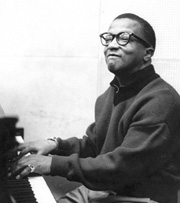Being Billy
A new CD celebrates the work of gay composer Billy Strayhorn.

By Tim Brookover
By now, savvy queer music enthusiasts know that Billy Strayhorn, who lived as an openly gay man at a time that being out and public was especially rough, worked side by side with Duke Ellington, one of the giants of 20th-century music. Fans with a bit more insight realize that Strayhorn wrote “Lush Life,” the ennui-infused cabaret standard (which opens “I used to visit all the very gay places”). Even dedicated aficionados, though, may not realize the depth of Strayhorn’s work as a composer and arranger over rich a career that spanned the ’30s to the ’60s.
Now a new CD released by jazz giant Blue Note seeks to bring greater attention to this most under-recognized American songwriter. Billy Strayhorn: Lush Life, released this month, contains 15 compositions performed by contemporary jazz stars, including Joe Lovano and Dianne Reeves. Elvis Costello, whose musical interests span genres, contributes a haunting rendition of “Blood Count,” Strayhorn’s final composition, which he wrote in the hospital shortly before his death in 1967 (with lyrics by Costello and here renamed “My Flame Burns Blue”). Reeves, unquestionably the premier jazz vocalist of her generation, celebrates Strayhorn with six tracks, including “Lush Life.” Reeves and the other performers appear in a new Robert Levi documentary airing on February 6 as part of the PBS series Independent Lens.











Comments